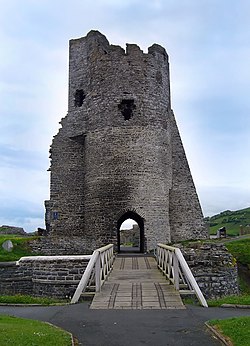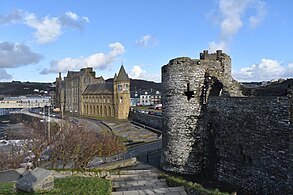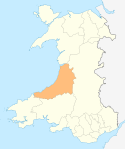Aberystwyth Castle
| Aberystwyth Castle | |
|---|---|
| Part of Ceredigion | |
| Aberystwyth, Wales | |
 Remains of the north tower gateway at Aberystwyth Castle. | |
| Coordinates | 52°24′48″N 4°05′23″W / 52.41324°N 4.08968°W |
| Type | Diamond-shaped concentric castle |
| Site information | |
| Controlled by | Aberystwyth Town Council |
| Condition | Ruin |
| Site history | |
| Built | 1277–1289 |
| Built by | Later work attributed to James of Saint George |
| In use | Open to public |
| Materials | Siltstone |
| Demolished | 1649 |
| Events | Welsh Wars English Civil War |
Listed Building – Grade I | |
Aberystwyth Castle (Welsh: Castell Aberystwyth) is a Grade I listed Edwardian fortress located in Aberystwyth, Ceredigion, Mid Wales. It was built in response to the First Welsh War in the late 13th century, replacing an earlier fortress located a mile to the south. During a national uprising by Owain Glyndŵr, the Welsh captured the castle in 1404, but it was recaptured by the English four years later. From 1637 it housed a Royal mint of Charles I, which minted coins from locally mined silver. The castle was slighted by Oliver Cromwell in 1649.
History
[edit]Marcher lord Gilbert de Clare built an earlier motte and bailey castle a mile south of the current site in around 1110.[1] In 1116 it was unsuccessfully besieged by Gruffydd ap Rhys, King of Deheubarth.[2] He was eventually successful in 1136, capturing it and burning it to the ground with the help of Owain Gwynedd and his brother, Cadwaladr ap Gruffydd, the sons of Gruffudd ap Cynan, King of Gwynedd.[3] Their sister, Gwenllian ferch Gruffydd, Gruffydd ap Rhys's wife, had been killed in battle by Gruffudd ab Llywelyn, who commanded for the Norman, Maurice de Londres. She had taken a force to meet him in battle at Kidwelly.[4] Owain Gwynedd gave the castle to Cadwaladr to rebuild, but in 1143, Cadwaladr was implicated in the murder of Anarawd ap Gruffydd, the new king of Deheubarth. Owain Gwynedd sent his son, Hywel, to strip Cadwaladr of his lands in Ceredigion, and the castle was burned.[5] It was rebuilt and later reinforced with timber and stone revetment and stone footings.[6] After a succession of at least three owners, it was taken by Welsh prince Llywelyn the Great in 1221.[7]
The current castle, as well as a new town,[8] was built in a new location to the north, the current site, by Edward I of England. Construction began in 1277 after the end of the first war against Llywelyn ap Gruffydd, Llywelyn the Great's grandson.[9] Work on the castle was initially slow, and at the start of the 1282 war, the Welsh took and burned both the castle and the town.[9] Probably under master mason James of St George,[10] the castle was eventually completed in 1289 at a cost of £4,000.[9] It was besieged extensively during the revolt of Madog ap Llywelyn[11] in 1294–5 but held out because it could be supplied by sea from Ireland.[9]
The adjoining walled town took its name from the older and important nearby village of Llanbadarn Fawr, and was thus called Llanbadarn Gaerog (English: Fortified Llanbadarn).[12] However, by the time of the Black Prince in 1343, the castle was in a bad state of disrepair; the main gateway and drawbridges, the king's hall and long chamber, the kitchen range, and the outer bailey were falling down.[13]
In 1404, Owain Glyndŵr captured and took possession of the castle during a national uprising against English occupation.[14] It became a seat of government[a] and in 1405, a treaty was signed between Glyndŵr and the King of France at the castle. Four years later, it was retaken by the English.[16] In 1637 Thomas Bushell prevailed upon Charles I to establish a Royal mint in Aberystwyth, sited in the castle hall.[17] This was authorised to mint the half-crown, shilling, half-shilling, two-pence, penny, groat, threepence, and half-penny coins, from silver that was mined locally in Ceredigion.[18]
The mint's operator raised a regiment of Royalist soldiers during the English Civil War,[18] and the mint ceased operations in September of 1642, when Charles I issued the Wellington Declaration. Bushell seems to have removed bullion and equipment to Shrewsbury, and operations were diverted to Oxford.[18] Oliver Cromwell's forces took the castle in 1646[9] and the castle was slighted in 1649.[19]
Architecture
[edit]Building work started in 1277 at the time of the First Welsh War,[9] during Edward I's first Welsh campaign at the same time as work started at Flint, Rhuddlan and Builth Wells.[10] The inner ward was built in a diamond-shaped concentric castle,[20] with a twin D-shaped gatehouse keep and mural towers at each corner.[21] The inner ward is enclosed by a narrow outer ward, and there was an encllosure to the north that has been lost to coastal erosion. The original building had no inner curtain wall to the west, prior to the war of 1282–83, after which it was added.[9]
-
Site of original Aberystwyth Castle at Tan-y-Castell
-
Castle walls, view over the Old College.
-
External view of the North Gate.
-
The remains of the D-shaped towers that formed the inner ward's gatehouse keep.
-
Side walls view.
See also
[edit]Notes
[edit]References
[edit]- ^ RCAHMW 301795.
- ^ Bridgeman 1876, p. 28.
- ^ Bridgeman 1876, p. 31.
- ^ Bridgeman 1876, p. 30.
- ^ Lea 1995.
- ^ Ixer & Browne 2017, p. 39.
- ^ Bridgeman 1876, p. 97.
- ^ Gravett & Hook 2007, p. 7.
- ^ a b c d e f g Kenyon 2010, p. 53.
- ^ a b Gravett & Hook 2007, p. 5.
- ^ Gravett & Hook 2007, pp. 52–53.
- ^ Chadwick 1958, p. 163.
- ^ Browne 2009.
- ^ Gravett & Hook 2007, p. 9.
- ^ Breverton 2012, chpt. 8.
- ^ Breverton 2012, chpt. 9.
- ^ RCAHMW 86.
- ^ a b c Evans 1915.
- ^ Gravett & Hook 2007, p. 58.
- ^ Gravett & Hook 2007, p. 22.
- ^ Gravett & Hook 2007, p. 15.
Bibliography
[edit]- Breverton, Terry (2012). Owain Glyndwr: The Story of the Last Prince of Wales (Kindle ed.). Amberley Publishing. ISBN 1445614987.
- Bridgeman, George Thomas Orlando (1876). History of the Princes of South Wales. Wigan: Thomas Birch. Retrieved 17 August 2024.
- Browne, David (16 December 2009). "7: Builth Castle and Aberystwyth Castle". In Williams, Diane; Kenyon, John R. (eds.). The Impact of the Edwardian Castles in Wales. Oxbow Books. ISBN 978-1-78297-367-6.
- Chadwick, Nora Kershaw (1958). Studies in the Early British Church. CUP Archive. Retrieved 16 August 2024.
- Evans, G.E. (1915). "The Royal Mint, Aberystwyth". Transactions of the Cardiganshire Antiquarian Society. 2 (1): 71. Retrieved 16 August 2024.
- Freeman, M (2011). Aberystwyth - A History And Celebration. Reigate: The Francis Frith Collection. ISBN 9781845896096.
- Gravett, Christopher; Hook, Adam (2007). The castles of Edward I in Wales, 1277-1307. Oxford: Osprey. ISBN 9781846030277.
- Griffiths, Ralph A. (2018). The Principality of Wales in the Later Middle Ages: The Structure and Personnel of Government: South Wales 1277-1536. University of Wales Press. ISBN 978-1-78683-266-5.
- Ixer, R. A.; Browne, D. M. (2017). "Excavations at Tan-y-Castell (the first castle of Aberystwyth) – a re-evaluation. Part 1: the pottery". Archaeology in Wales. 56: 36–60.
- Kenyon, John R. (2010). The medieval castles of Wales. Cardiff: University of Wales press. ISBN 9780708321805.
- Lea, Anne Elizabeth (1995). Contextualizing the "gorhoffeddau": A study in the intellectual background of two medieval Welsh poems (PhD thesis). Harvard University. Retrieved 18 August 2024.
- "Aberystwyth Castle (86)". Coflein. RCAHMW. Retrieved 16 August 2024.
- "Castell Tan y Bwlch Castle (301795)". Coflein. RCAHMW. Retrieved 16 August 2024.









